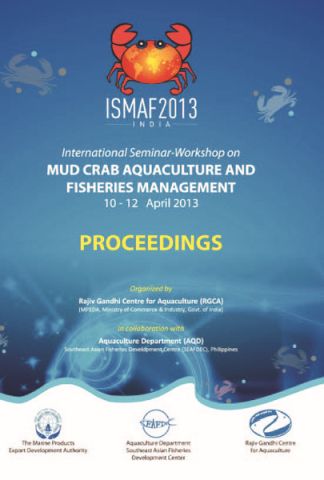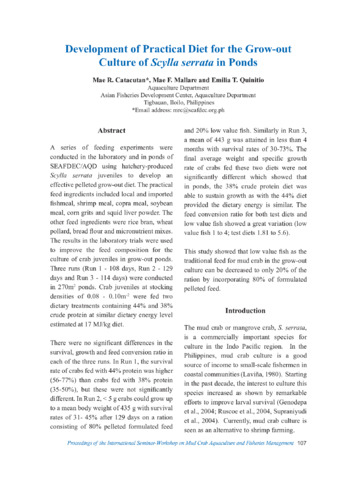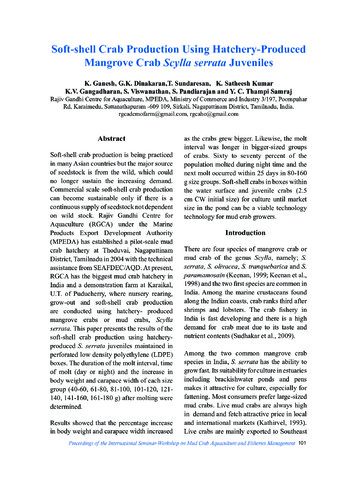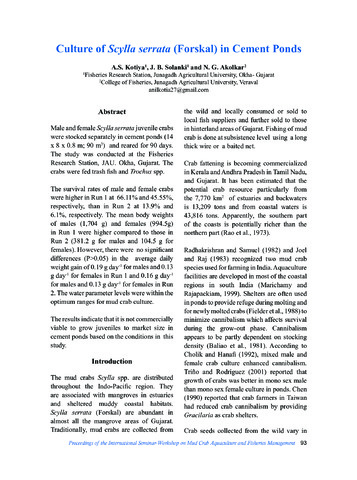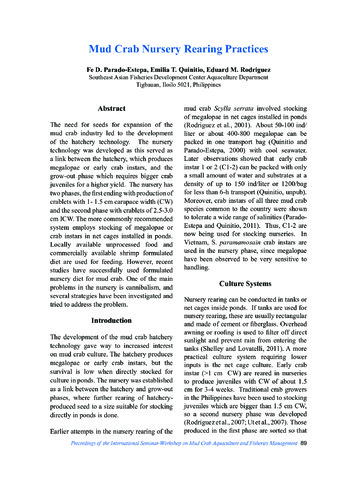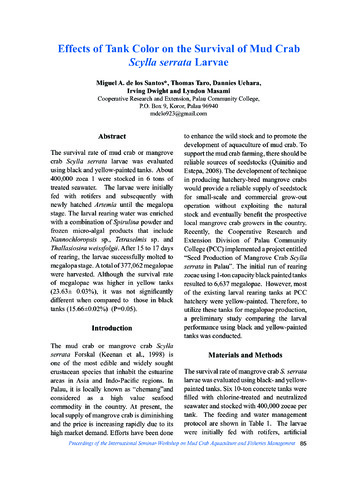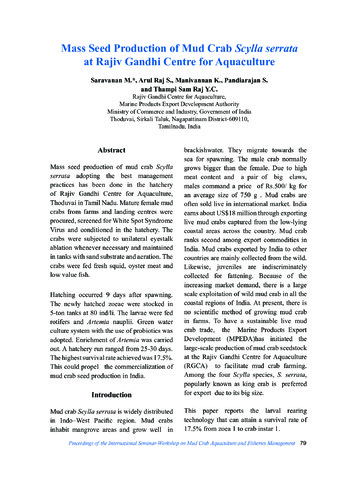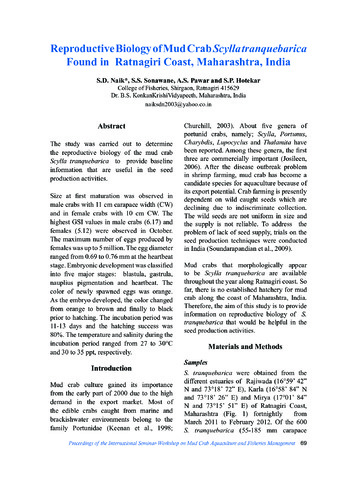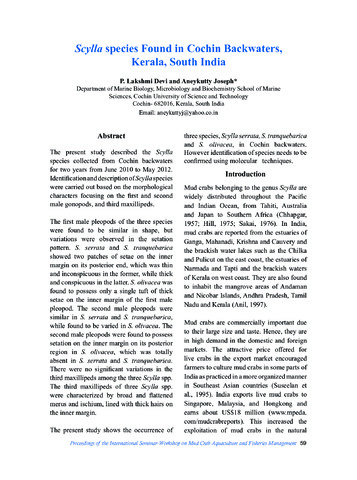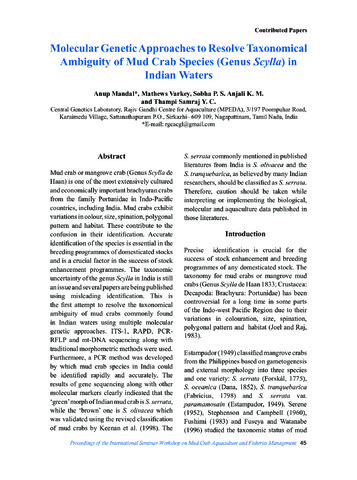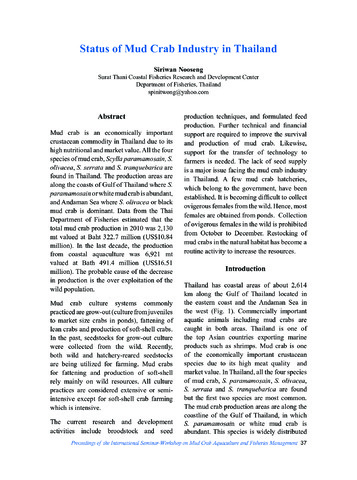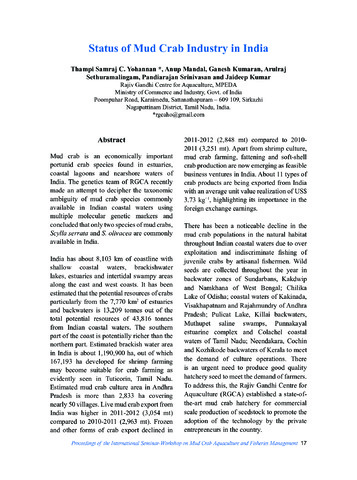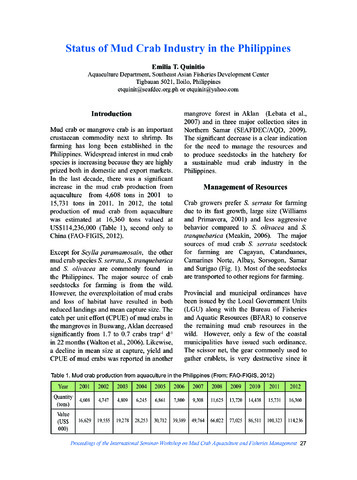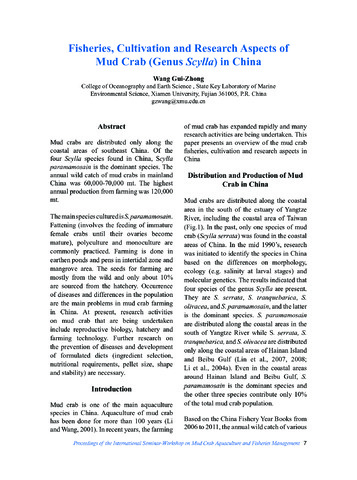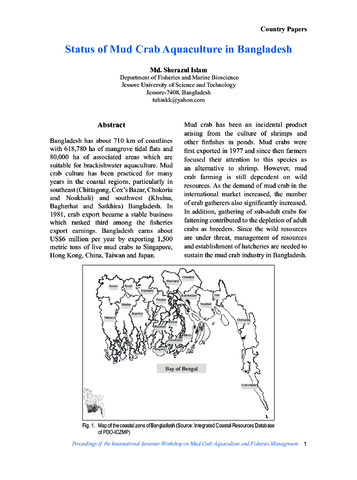International Seminar-Workshop on Mud Crab Aquaculture and Fisheries Management (ISMAF 2013)
Contents
- Country Papers
-
Contributed Papers
- Molecular Genetic Approaches to Resolve Taxonomical Ambiguity of Mud Crab Species (Genus Scylla) in Indian Waters
- Scylla species found in Cochin Backwaters, Kerala, South India
- Reproductive Biology of Green Crab Scylla tranquebarica (Fabricius, 1897) Found in Ratnagiri Coast, Maharashtra, India
- Mass Seed Production of Mud Crab Scylla serrata at Rajiv Gandhi Centre for Aquaculture
- Effects of Tank Color on the Survival of Mud Crab Scylla serrata Larvae
- Mud Crab Nursery Rearing Practices
- Culture of Scylla serrata (Forskal) in Cement Ponds
- Soft- shell Crab Production Using Hatchery-Produced Mangrove Crab Scylla serrata Juveniles
- Development of Practical Diet for the Grow-out Culture of Scylla serrata in Ponds
- Workshop Sessions
- Appendices
- List of Papers Presented
- List of Participants
ອຸປະກອນການລົງທະບຽນຫຼ້າສຸດ
-
Proceedings of the International Seminar-Workshop on Mud Crab Aquaculture and Fisheries Management, 10-12 April 2013, Tamil Nadu, India
(Rajiv Gandhi Centre for Aquaculture (MPEDA), 2015) -
Development of practical diet for the grow-out culture of Scylla serrata in ponds
(Rajiv Gandhi Centre for Aquaculture (MPEDA), 2015)A series of feeding experiments were conducted in the laboratory and in ponds of SEAFDEC/AQD using hatchery-produced Scylla serrata juveniles to develop an effective pelleted grow-out diet. The practical feed ingredients ... -
Soft-shell crab production using hatchery-produced mangrove crab Scylla serrata juveniles
(Rajiv Gandhi Centre for Aquaculture (MPEDA), 2015)Soft-shell crab production is being practiced in many Asian countries but the major source of seedstock is from the wild, which could no longer sustain the increasing demand. Commercial scale soft-shell crab production can ... -
Culture of Scylla serrata (Forskal) in cement ponds
(Rajiv Gandhi Centre for Aquaculture (MPEDA), 2015)Male and female Scylla serrata juvenile crabs were stocked separately in cement ponds (14 x 8 x 0.8 m; 90 m3) and reared for 90 days. The study was conducted at the Fisheries Research Station, JAU. Okha, Gujarat. The crabs ... -
Mud crab nursery rearing practices
(Rajiv Gandhi Centre for Aquaculture (MPEDA), 2015)The need for seeds for expansion of the mud crab industry led to the development of the hatchery technology. The nursery technology was developed as this served as a link between the hatchery, which produces megalopae or ... -
Effect of tank color on the survival of mud crab Scylla serrata larvae
(Rajiv Gandhi Centre for Aquaculture (MPEDA), 2015)The survival rate of mud crab or mangrove crab Scylla serrata larvae was evaluated using black and yellow-painted tanks. About 400,000 zoea 1 were stocked in 6 tons of treated seawater. The larvae were initially fed with ... -
Mass seed production of mud crab Scylla serrata at Rajiv Gandhi Centre for Aquaculture
(Rajiv Gandhi Centre for Aquaculture (MPEDA), 2015)Mass seed production of mud crab Scylla serrata adopting the best management practices has been done in the hatchery of Rajiv Gandhi Centre for Aquaculture, Thoduvai in Tamil Nadu. Mature female mud crabs from farms and ... -
Reproductive biology of mud crab Scylla tranquebarica found in Ratnagiri coast, Maharashtra, India
(Rajiv Gandhi Centre for Aquaculture (MPEDA), 2015)The study was carried out to determine the reproductive biology of the mud crab Scylla tranquebarica to provide baseline information that are useful in the seed production activities. Size at first maturation was observed ... -
Scylla species found in Cochin backwaters, Kerala, South India
(Rajiv Gandhi Centre for Aquaculture (MPEDA), 2015)The present study described the Scylla species collected from Cochin backwaters for two years from June 2010 to May 2012. Identification and description of Scylla species were carried out based on the morphological characters ... -
Molecular genetic approaches to resolve taxonomical ambiguity of mud crab species (Genus Scylla) in Indian waters
(Rajiv Gandhi Centre for Aquaculture (MPEDA), 2015)Mud crab or mangrove crab (Genus Scylla de Haan) is one of the most extensively cultured and economically important brachyuran crabs from the family Portunidae in Indo-Pacific countries, including India. Mud crabs exhibit ... -
Status of mud crab industry in Thailand
(Rajiv Gandhi Centre for Aquaculture (MPEDA), 2015)Mud crab is an economically important crustacean commodity in Thailand due to its high nutritional and market value. All the four species of mud crab, Scylla paramamosain, S. olivacea, S. serrata and S. tranquebarica are ... -
Status of mud crab industry in India
(Rajiv Gandhi Centre for Aquaculture (MPEDA), 2015)Mud crab is an economically important portunid crab species found in estuaries, coastal lagoons and nearshore waters of India. The genetics team of RGCA recently made an attempt to decipher the taxonomic ambiguity of mud ... -
Status of mud crab industry in the Philippines
(Rajiv Gandhi Centre for Aquaculture (MPEDA), 2015)Mud crab farming has long been established in the Philippines. Scylla serrata, S. tranquebarica and S. olivacea are the common species found in the Philippines. S. serrata is the preferred species for farming by crab ... -
Fisheries, cultivation and research aspects of mud crab (Genus Scylla) in China
(Rajiv Gandhi Centre for Aquaculture (MPEDA), 2015)Mud crabs are distributed only along the coastal areas of southeast China. Of the four Scylla species found in China, Scylla paramamosain is the dominant species. The annual wild catch of mud crabs in mainland China was ... -
Status of mud crab aquaculture in Bangladesh
(Rajiv Gandhi Centre for Aquaculture (MPEDA), 2015)Bangladesh has about 710 km of coastlines with 618,780 ha of mangrove tidal flats and 80,000 ha of associated areas which are suitable for brackishwater aquaculture. Mud crab culture has been practiced for many years in ...

